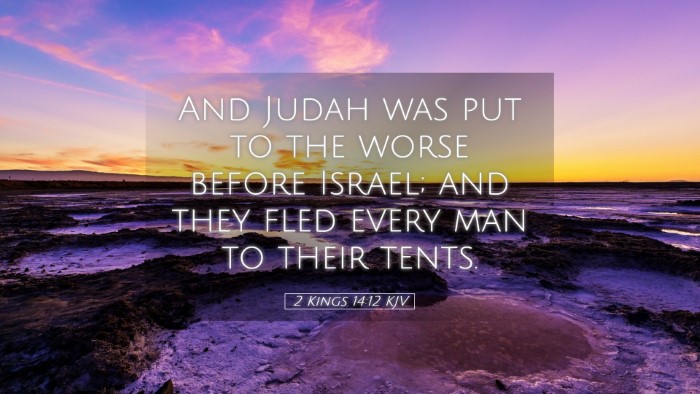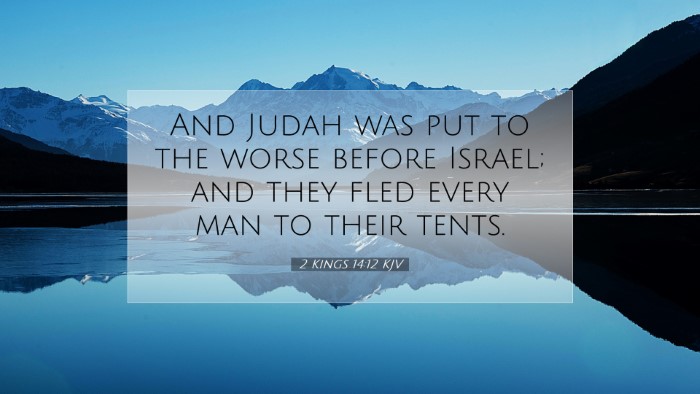Commentary on 2 Kings 14:12
Bible Verse: "And Judah was put to the worse before Israel; and they fled every man to their tents." (2 Kings 14:12)
Introduction
This verse encapsulates a crucial moment in the history of Judah and Israel during the reign of King Amaziah of Judah. The defeat of Judah at the hands of the northern kingdom of Israel illustrates the political and military tensions that characterized this period. This commentary seeks to draw insights from various public domain sources such as Matthew Henry, Albert Barnes, and Adam Clarke, providing a deeper understanding of the implications surrounding this verse.
Contextual Background
The backdrop of 2 Kings 14 is the ongoing rivalry between the kingdoms of Israel and Judah. Under the leadership of Amaziah, Judah had a mixed legacy of faithfulness to God and rebellion against divine commandments. His military endeavors against Edom laid the groundwork for the subsequent conflict with Israel.
Matthew Henry's Perspective
Matthew Henry notes that this conflict symbolizes not merely a physical battle but reflects the spiritual declension of Judah. He observes that Amaziah, confident after his victories, challenged Israel, neglecting to seek God's counsel, which ultimately led to his downfall. His commentary emphasizes that whimsical pride, unrooted in faith, can lead to dire consequences.
Albert Barnes' Insights
Albert Barnes references the broader context of Israel's military successes under Jeroboam II. He considers this defeat as indicative of God’s judgment against Judah for its idolatry and spiritual apathy. Barnes argues that this verse showcases the transitory nature of military success without divine endorsement, framing it as a cautionary tale for leaders and nations alike.
Adam Clarke's Analysis
Adam Clarke elaborates on the significance of the phrase “they fled every man to their tents.” He highlights that this route was emblematic of panic and disarray, revealing the fractured state of Judah's military forces. Clarke asserts that this moment of retreat serves as a spiritual metaphor for those who turn away from God, illustrating the futility of human strength when not aligned with divine purpose.
Theological and Practical Implications
This verse presents several critical theological and practical implications for contemporary readers, especially pastors, students, and theologians.
The Sovereignty of God
One of the primary themes drawn from this account is the sovereignty of God over nations and their affairs. Despite Amaziah's efforts, the ultimate outcome was determined by the divine will. This aspect invites reflection on the nature of divine justice and mercy.
Human Arrogance and Its Consequences
The pride of Amaziah, who underestimated the might of Israel and presumed on earlier victories, mirrors the human tendency to lean on one's understanding and abilities. Christian leaders are reminded to seek divine guidance and remain humble before God.
The Nature of True Victory
This passage invites a re-examination of what constitutes victory in the life of a believer. True success is found not in military prowess or earthly achievements but in faithfulness to God’s commandments and reliance on His strength.
Emphasis on Unity and Division
Judah's defeat manifested a deeper spiritual division, a warning against internal strife within the body of Christ. The church is called to unity, mirroring the camaraderie that ought to exist among believers, illustrating how division leads to vulnerability against external forces.
Conclusion
The events encapsulated in 2 Kings 14:12 provide more than a historical account; they offer lessons about faith, leadership, and divine sovereignty. The reflections from notable commentators encourage contemporary readers—including pastors, students, and scholars—to navigate their spiritual journeys with humility, reliance on God, and a commitment to unity within the body of Christ.


